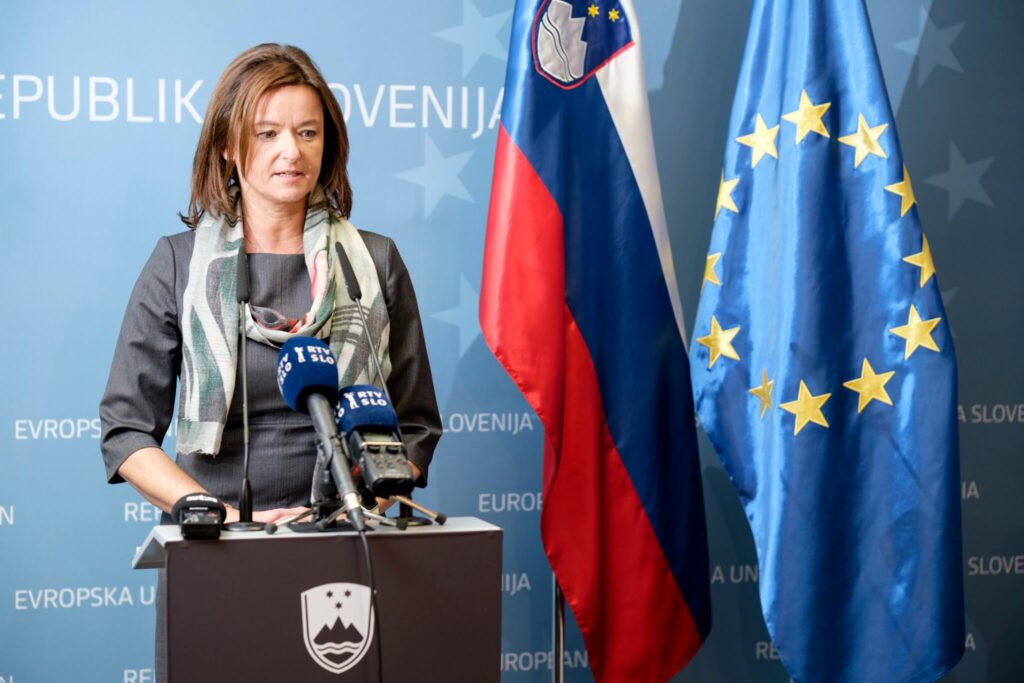On Monday, Slovenian Minister of Foreign Affairs, Tanja Fajon, attended a meeting of foreign ministers of the European Union, during which she practically admitted that the attitude of the government of Robert Golob towards illegal migration is producing disastrous results. “When Croatia joins the Schengen area, we do not want Slovenia to become a kind of a pocket with the increase of illegal migrants and refugees,” she said in Brussels, adding that controlling international borders (borders of the European Union – meaning, Slovenia’s national borders) is a major challenge for our country.
The painful confession she made before her fellow EU foreign ministers is, of course, something she is unable to repeat in domestic circles, where she and the entire government team she is part of are collectively pretending that Slovenia is not sinking deeper and deeper into the migration abyss, the end result of which will be the creation of a “migration pocket,” which she warned against yesterday, in Brussels.
The blatant hypocrisy of Tanja Fajon has provoked strong reactions from the opposition. Branko Grims, an MP of the Slovenian Democratic Party (Slovenska demokratska stranka – SDS), warned that hypocritical people should be feared, and the leader of the same parliamentary group, Jelka Godec, pointed to the obvious hypocrisy in the coalition ranks. “When I warned that we should not become a migration pocket, Golob’s power-drunk coalition team mocked me to no end. I read those same words spoken by Tanja Fajon abroad, and now all we can hear is a grave silence… People who are so drunk on power and so duplicitous are a danger to Slovenia,” Grims wrote. On the other hand, Jelka Godec exposed how the coalition works in the current situation. Drunk on power, they keep laughing at the common-sense criticism coming at them from the opposition ranks.
It is quite clear that the rush of migrants to Slovenia and the drastic increase in illegal border crossings are a direct consequence of the Robert Golob government ascending to power. Even before taking power, the latter had made clear and unequivocal promises that his government would remove the fence on the border with Croatia. The current opposition was already warning at the time that this was a foolish move which would be seen as a direct invitation by the many illegal migrants from the Third World countries who are wandering or are stranded somewhere along the Balkan migration route. And, of course, this is exactly what has happened, the crossings have increased to the point where the police often record up to 600 or more illegal border crossings in a single weekend, and we report on this extensively.
A lack of common sense in the current coalition
This simple, common-sense logic that such invitations signal that a government which is permissive towards illegal migration is in power, is apparently something that the current coalition is incapable of applying in its work, at least not in public discourse. Privately or in the right circles, they are ready to admit the terrible consequences of the dreamy policies that they clearly have no intention of reversing. The reasons for this behaviour are probably to be found in the belief that the fence on the border with Croatia has become the subject of a cultural fight between the centre-right and the left, and also in the fact that the entire coalition is being held “hostage” by the far-left party – the Left (Levica), whose members do not believe in the viability of the existence of the state as such, and are supporters of “global communism,” as one of the party’s MPs, Miha Kordiš, recently said.
Who did the voters even vote for in the first place?
These days, the people who cast their vote for Tanja Fajon can rightfully wonder who they actually voted for. It has long been clear to the more astute political insiders that Tanja Fajon is the product of negative selection within the Slovenian left. A politician with no opinions of her own, a figure for the political agenda, who publicly expresses the opinions of certain backgrounds, or loudly says what an adviser whispers to her. This is also the opinion of former Minister of Foreign Affairs Dimitrij Rupel, which we also recently wrote about.
Gal Kovač


